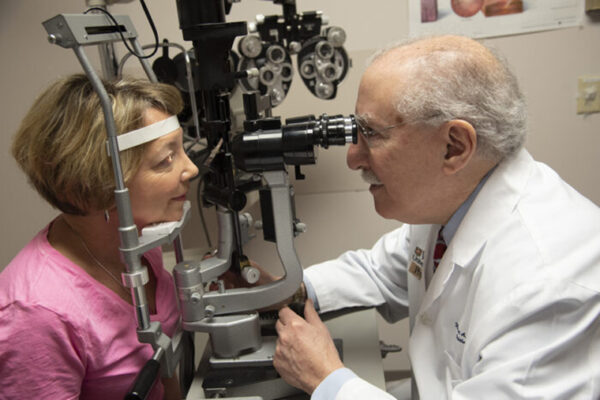Researchers elected to American Society for Clinical Investigation
Five physician-scientists at the School of Medicine have been elected members of the American Society for Clinical Investigation in recognition of original, creative and independent investigations in the clinical or allied sciences of medicine.
Treatment not always needed to prevent vision loss in patients with elevated eye pressure
More than 20 years after the launch of a landmark clinical trial led by the School of Medicine’s Michael A. Kass, MD, follow-up exams and analyses found that not all patients with elevated eye pressure need pressure-lowering treatment to prevent vision loss from glaucoma.
Odibo named director of maternal-fetal & ultrasound division in OB-GYN
Anthony Odibo, MD, an internationally respected maternal-fetal medicine expert, has been named director of the Division of Maternal-Fetal Medicine & Ultrasound in the Department of Obstetrics & Gynecology at the School of Medicine.
Gordon receives Kober Medal
Jeffrey Gordon, MD, has received the 2021 Kober Medal, one of the highest awards in academic medicine. Given by the Association of American Physicians, the honor recognizes Gordon’s extraordinary contributions to the field of gut microbiome research.
Markowitz appointed to professional development role
Scott Markowitz, MD, has been named inaugural vice chair for professional development and diversity, equity and inclusion in the Department of Anesthesiology at the School of Medicine.
Vaccination clinic volunteers needed
With COVID-19 vaccination appointments now available through Washington University in St. Louis for all students, faculty, staff and their family members ages 18 and over, the university needs volunteers to help staff the vaccination clinic on the Medical Campus.
Changing how we see the brain
By studying our brain’s connectome, behavioral neuroscientist Damien Fair is drawing a new map of autism.
Leana Wen: When science and politics vie
During the pandemic, Leana Wen had to sort through the confusion when politicians and pundits contradicted health experts.
For malnourished children, a new type of microbiome-directed food boosts growth
A new study shows that a therapeutic food designed to repair the gut microbiomes of malnourished children is better than standard therapy in supporting their growth. The study was led by researchers at the School of Medicine and was published in The New England Journal of Medicine.
Spencer named to leadership role in medical education
Abby L. Spencer, MD, has been named vice chair of education and professor of medicine in the Department of Medicine at the School of Medicine; director of the School of Medicine’s Academy of Educators; and to the editorial board of the Journal of General Internal Medicine.
View More Stories









